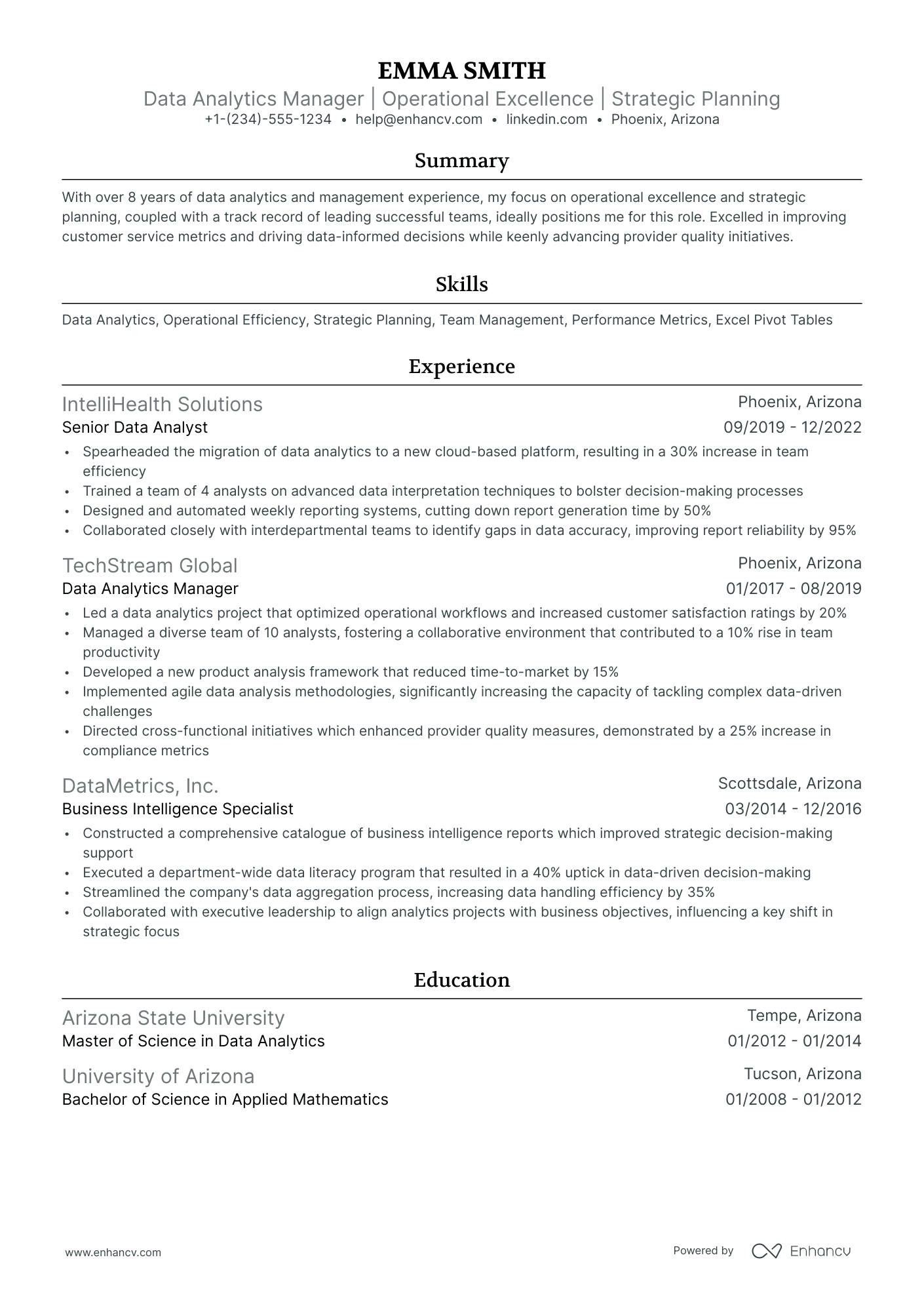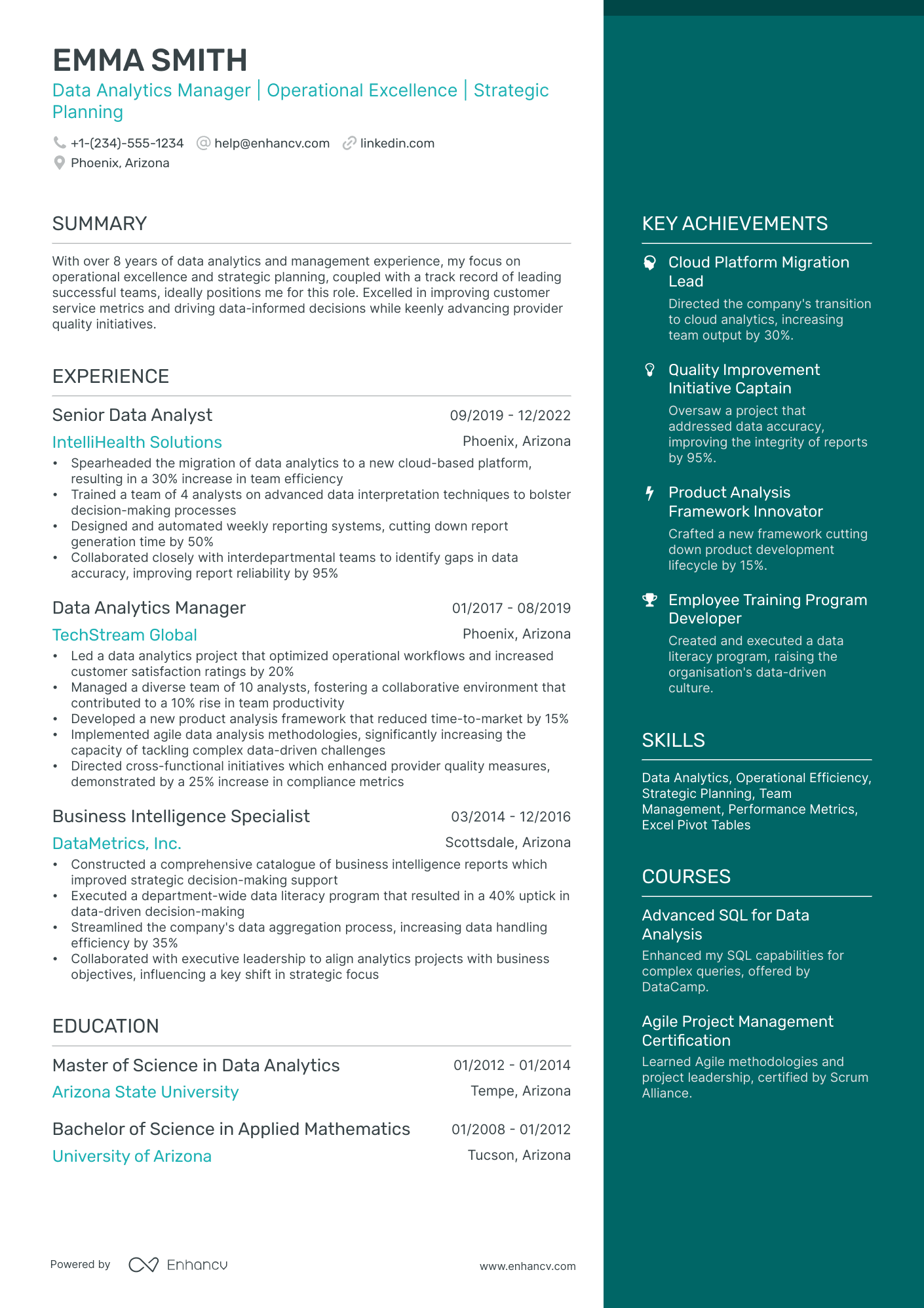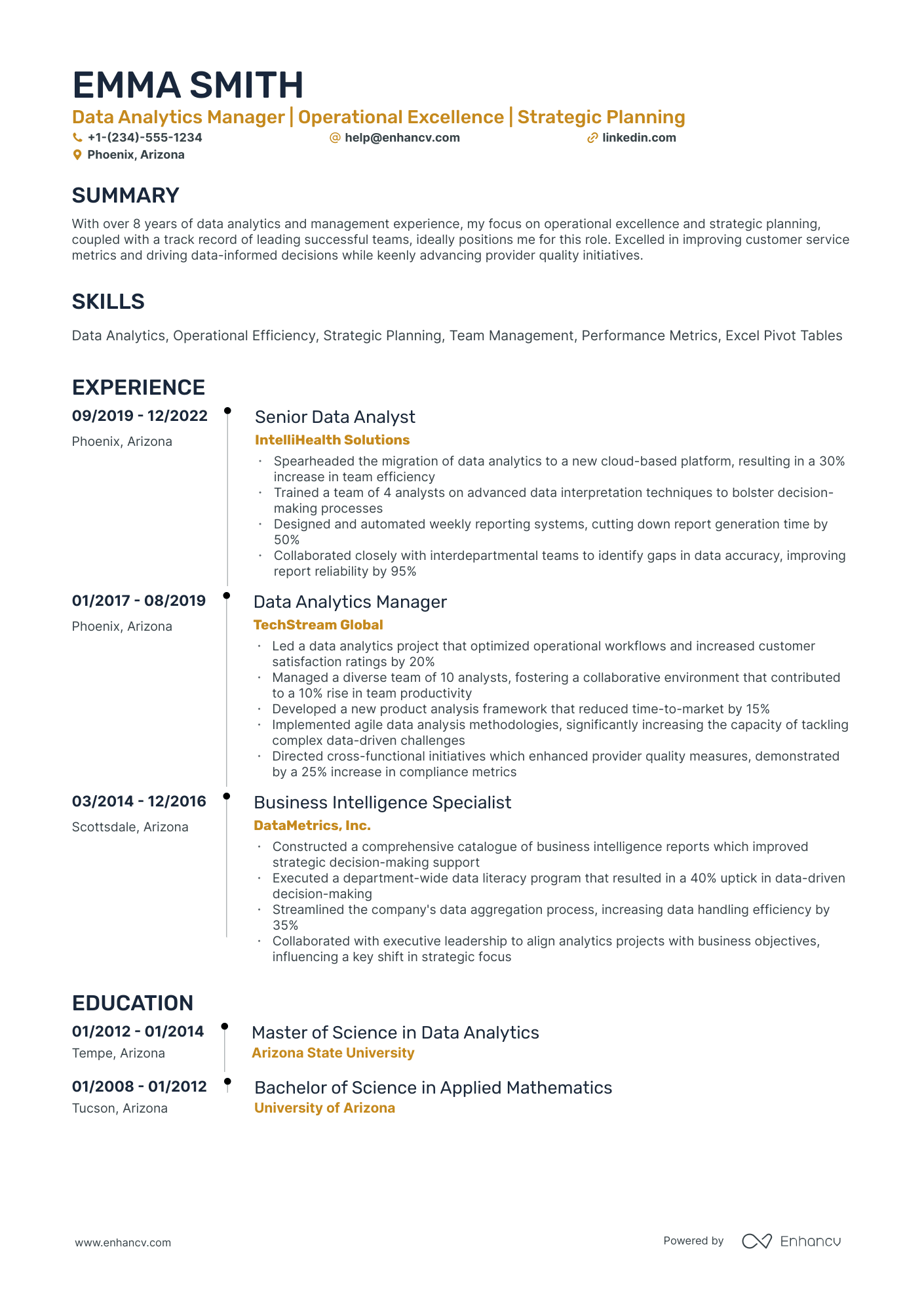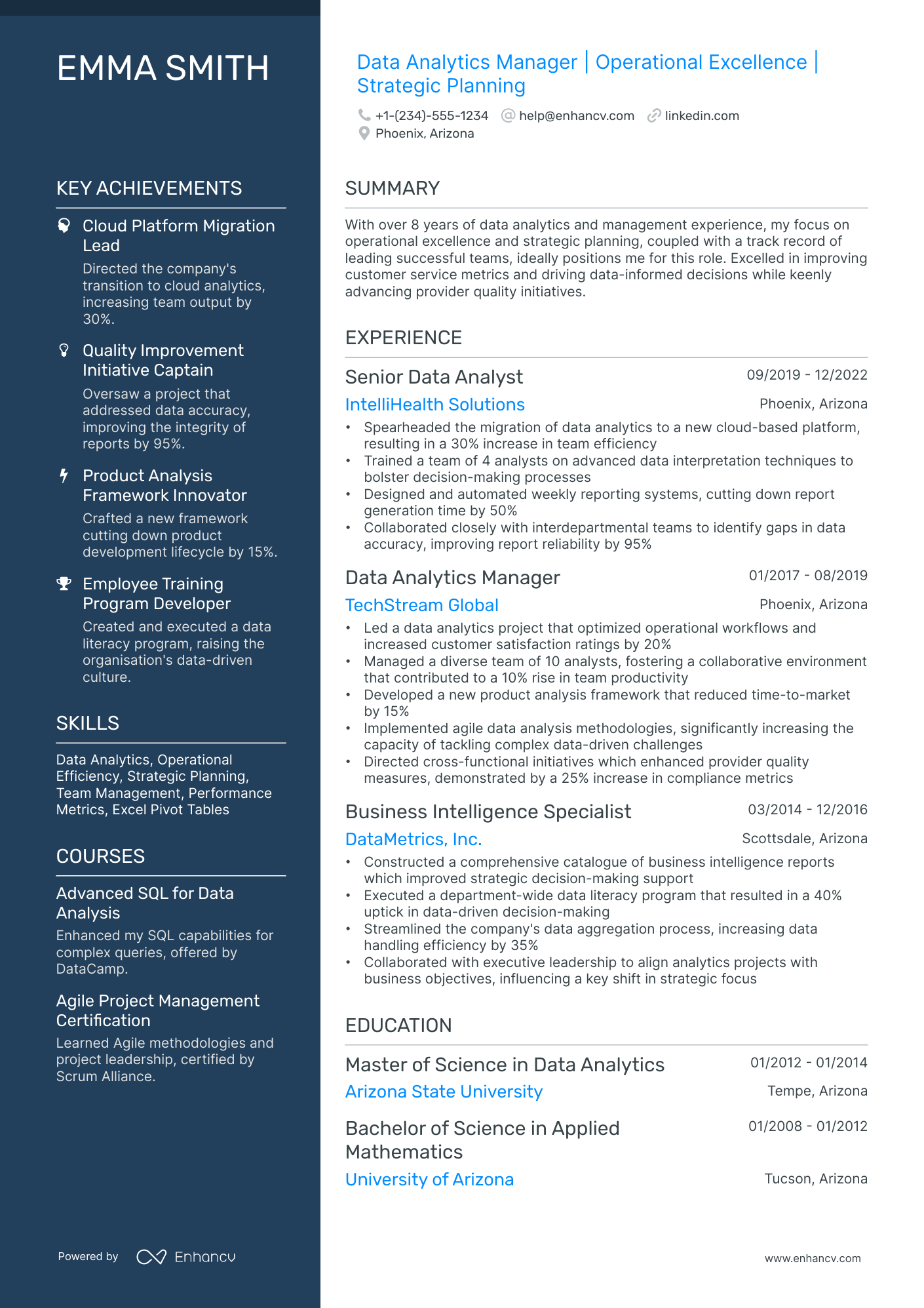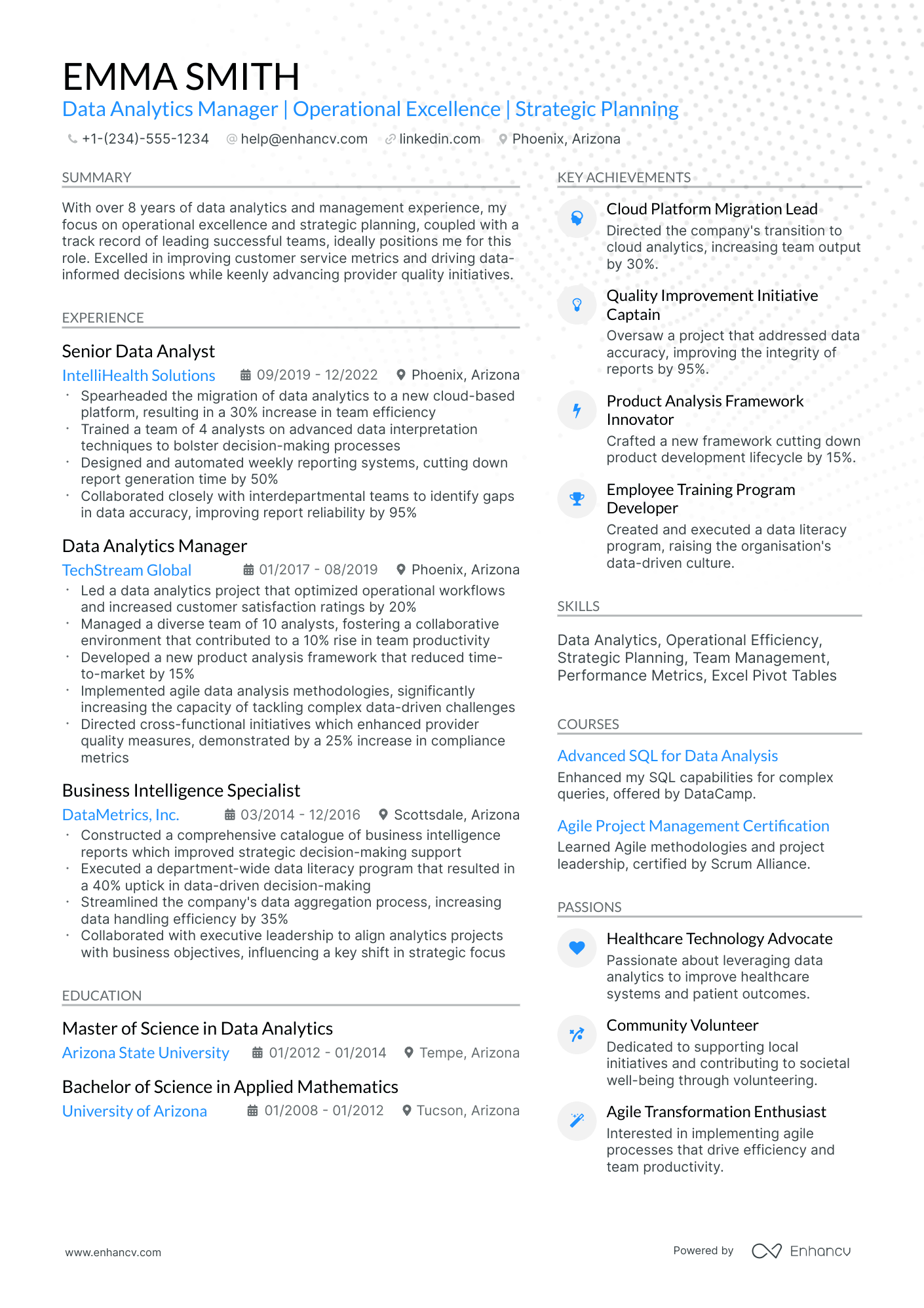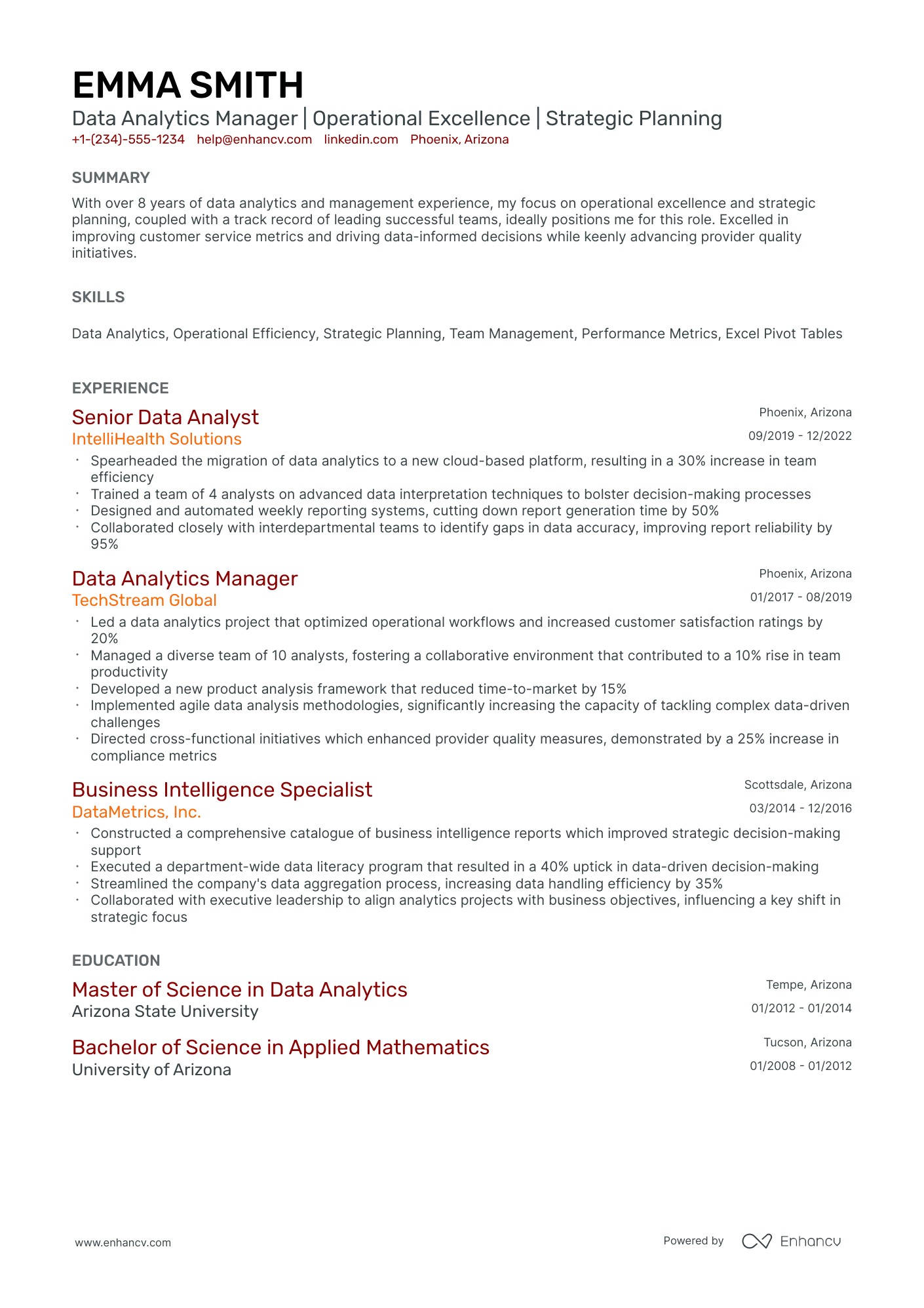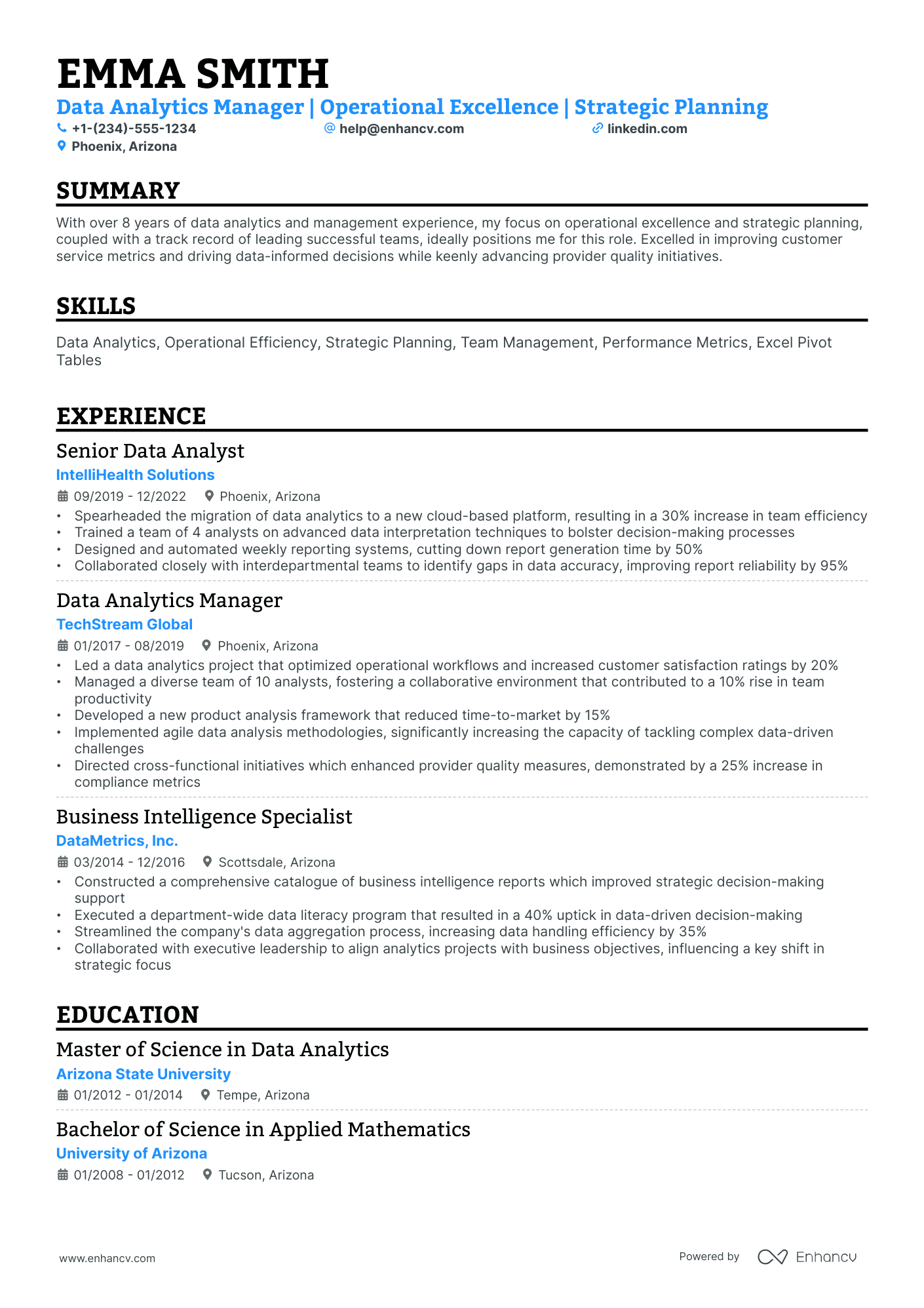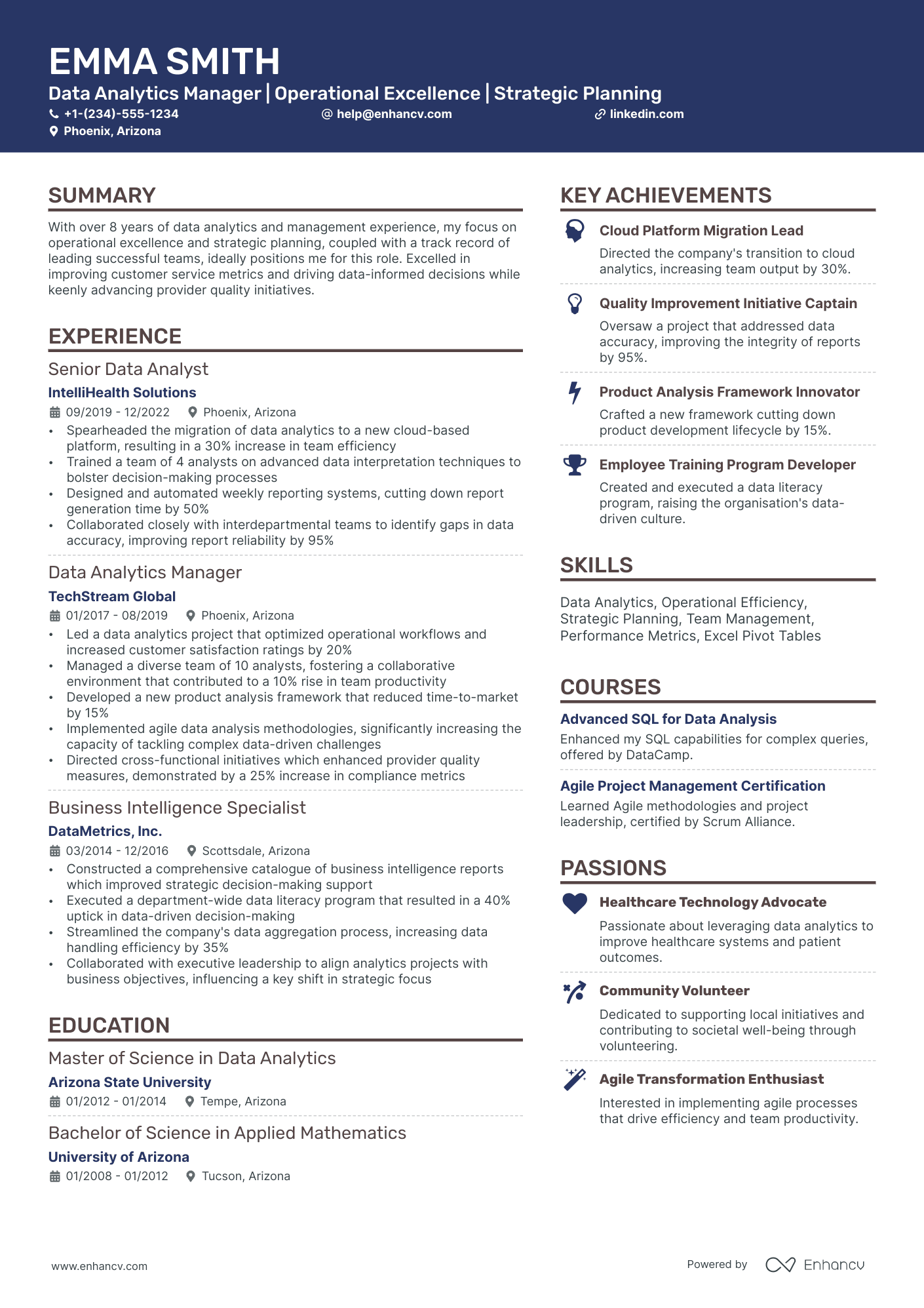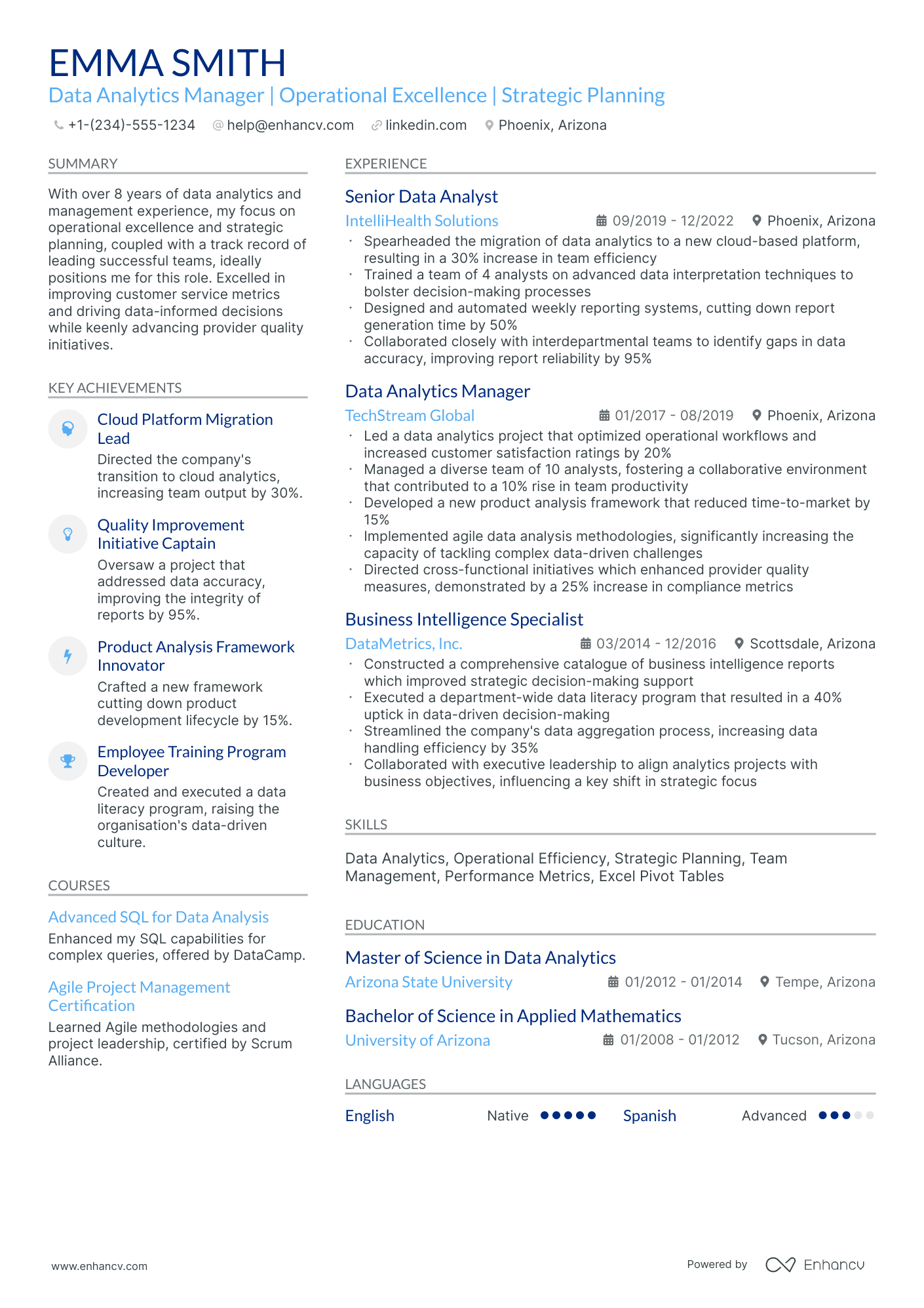As an analytics manager, articulating your complex technical expertise and achievements within the limited space of a resume can be daunting. Our guide offers structured methods and tailored examples that will help you concisely convey your analytical prowess and managerial successes.
- Aligning the top one-third of your analytics manager resume with the role you're applying for.
- Curating your specific analytics manager experience to get the attention of recruiters.
- How to list your relevant education to impress hiring managers recruiting for the analytics manager role.
Discover more analytics manager professional examples to help you write a job-winning resume.
- Social Media Director Resume Example
- Content Manager Resume Example
- Creative Digital Marketing Resume Example
- Event Marketing Resume Example
- Director of Communications Resume Example
- Brand Director Resume Example
- Entry Level Digital Marketing Resume Example
- Email Marketing Manager Resume Example
- Public Relations Director Resume Example
- Marketing Project Manager Resume Example
Simple guide to your analytics manager resume format and layout
Successful analytics manager resumes all have one specific characteristic - candidates have invested in a simple resume layout . One that is easy to read, makes a good first impression, and is adapted to their professional experience. There are three distinct resume formats to help you focus on your:
- professional experience - use the reverse-chronological resume format;
- skills and achievements - via the functional skill-based resume format;
- both experience and skills - with a hybrid resume format .
What is more, keep in mind that your resume may be initially assessed by the ATS (Applicant Tracker System) (or the software used by companies in the hiring process). The analytics manager resumes that suit the ATS:
- have a header that includes either a role keyword or the job you're applying for;
- should be no longer than two pages;
- be submitted as PDF, unless specified otherwise.
Consider your target market – resumes in Canada, for example, follow different layout conventions.
Upload & Check Your Resume
Drop your resume here or choose a file. PDF & DOCX only. Max 2MB file size.
PRO TIP
List all your relevant higher education degrees within your resume in reverse chronological order (starting with the latest). There are cases when your PhD in a particular field could help you stand apart from other candidates.
The five (plus) definite sections your resume for a analytics manager job should include are:
- Header with your headline, contact details, and/or a preview of your work
- Summary (or objective) to pinpoint how your success aligns with the role
- Experience with bullets of your most relevant achievements in the field
- Skills to integrate vital job requirements (both technical and personal)
- Your further dedication to the field, showcased via relevant higher education and/or certifications
What recruiters want to see on your resume:
- Proven experience with data analysis and statistical tools
- Demonstrable leadership skills and experience managing an analytics team
- Strong understanding of database management, data warehousing, and data modeling
- Expertise in business intelligence (BI) tools and data visualization software
- Ability to translate complex data findings into actionable business insights
Experts' advice on writing your analytics manager resume experience
While the excitement and motivation for writing your analytics manager resume was present in the first hour (or so), you now find yourself staring at the blank page.
The resume experience section is the one that allows you to make a memorable impression by matching job requirement with your past jobs and accomplishments.
To help you write this resume section, here are four mistakes you need to avoid:
- Listing every job you have had so far, including the irrelevant ones. Before that, consider each of your past roles based on relevancy to the role. It may be the case that the job you had 15 years ago may have taught you invaluable skills that are appropriate for the role;
- Including irrelevant work experience items. Those are past jobs that aren't linked with the role you're applying for (or so they seem). Consider how your past jobs will serve your professional presentation: will they be filling in a gap in your work history, or just taking up space?
- Focusing on responsibilities instead of accomplishments. Your analytics manager resume shouldn't just be telling recruiters what you did in the past - as it's most often the case that candidates have had similar responsibilities. But, rather, the experience section should showcase the success you've attained in each past role, thanks to your unique skill set;
- Consider listing just your professional experience. Any role you've had in the past - e.g. volunteering, internships, etc. - can make it into your analytics manager resume experience section. Make sure to include it alongside numbers and results.
Two more things you need to remember about your resume experience section.
The first are keywords. Or those specific job requirements that are crucial for the role . Ensure you've integrated them across your experience section to get sorted closer to the ideal candidate profile by the Applicant Tracker System (ATS).
The second are action verbs. Each of your experience bullets should start with a strong action verb, followed by your specific skill and your on the job achievements. Follow this formula to hint to recruiters what your unique value as a professional is.
Still with us? In the next section, we will show you how industry-leading professionals have avoided the four most common mistakes, while integrating keywords and action verbs in their experience section.
- Spearheaded the analytics initiative, which enhanced data-driven decision-making by establishing new KPIs, leading to a 20% increase in overall efficiency at Oracle.
- Managed a team of data analysts and scientists, successfully implementing machine learning algorithms that forecasted market trends with 95% accuracy.
- Designed and executed a comprehensive big data strategy that integrated multiple data sources, improving customer segmentation and targeting by 25% at Oracle.
- Oversaw the development of an analytical framework at IBM that identified $10M in cost-saving opportunities through optimized supply chain operations.
- Directed the deployment of business intelligence tools at IBM that transformed raw data into actionable insights, significantly enhancing the decision-making process.
- Initiated and led cross-functional teams that delivered a customer analytics platform, increasing customer retention rates by 15% at IBM.
- Drove advanced analytics projects at Accenture which increased clients' operational efficiency by an average of 30% through predictive modeling and data visualization techniques.
- Championed the adoption of a tailored data governance strategy, enhancing data quality and accessibility for analytics purposes at Accenture.
- Cultivated a culture of continuous improvement by mentoring analytics personnel, leading to a 50% increase in the team's productivity and output quality at Accenture.
- Implemented a cloud-based analytics solution at HP that reduced data processing times by 40% and enabled real-time insights into business operations.
- Led the development of custom analytical reporting dashboards at HP that supported executive strategic planning and reporting, resulting in improved process transparency.
- Facilitated inter-departmental data collaboration at HP by designing a centralized data warehouse, which unified disparate data sets and optimized reporting functions.
- Catalyzed a data-centric culture shift at Deloitte by spearheading a company-wide analytics education program, increasing data literacy among staff by 70%.
- Led the delivery of a multimillion-dollar analytics project at Deloitte that equipped major retail clients with sophisticated market basket analysis tools, boosting their sales performance by 18%.
- Architected the migration of legacy systems to a modern analytics platform at Deloitte, ensuring seamless transition and user adoption, and reducing maintenance costs by 25%.
- Orchestrated the integration of a new advanced analytics system at McKinsey, which allowed for tracking and analyzing consumer behavior patterns, improving marketing ROI by 22%.
- Established a robust data validation process at McKinsey, enhancing data integrity and reliability, which played a crucial role in securing two industry awards for analytical excellence.
- Played a key role in McKinsey's strategic planning by providing data-backed market entry recommendations that yielded a successful expansion into three new international markets.
- Developed a company-wide data monetization strategy at SAS Institute, identifying untapped data assets, which generated an additional revenue stream of $5M annually.
- Played a pivotal role in SAS Institute's customer success stories by delivering personalized analytics solutions that increased client satisfaction scores by 20%.
- Pioneered the development of innovative predictive analytics projects at SAS Institute, significantly reducing risk and enhancing profitability for key financial sector clients.
- Initiated a data democratization initiative at Tableau Software, which empowered employees to access and utilize data insights, improving operational efficiencies by 15%.
- Steered the creation of interactive data visualization tools at Tableau Software that streamlined the reporting process for management, cutting down report generation time by 50%.
- Facilitated strategic partnerships at Tableau Software with third-party data providers, enhancing the company's data offerings and increasing competitive market positioning.
- Challenged the status quo at Amazon by implementing a large-scale data warehouse optimization project, which led to a 35% reduction in query processing times.
- Instrumental in developing an AI-driven recommendation system at Amazon that improved cross-selling strategies, contributing to a 10% uplift in sales within the electronics division.
- Enhanced customer experience metrics at Amazon by utilizing sentiment analysis models, leading to a significant 12% improvement in net promoter scores (NPS).
- Revolutionized data reporting practices at Facebook by adopting an insights-driven approach, which supported a 30% increase in ad revenue through optimized targeting.
- Directed Facebook's analytics team to focus on social media trends analysis using big data, providing crucial insights that shaped content creation and distribution strategies.
- Served as the lead analytics liaison at Facebook for cross-company initiatives, fostering collaborations that resulted in new feature developments and user engagement strategies.
The following content includes information from "O*NET OnLine" by the U.S. Department of Labor, Employment and Training Administration (USDOL/ETA). Used under the CC BY 4.0 license. The data represents the top responsibilities present on the task lists for analytics manager professionals.
Top Responsibilities for Analytics Manager:
- Develop data warehouse process models, including sourcing, loading, transformation, and extraction.
- Verify the structure, accuracy, or quality of warehouse data.
- Map data between source systems, data warehouses, and data marts.
- Develop and implement data extraction procedures from other systems, such as administration, billing, or claims.
- Design and implement warehouse database structures.
- Develop or maintain standards, such as organization, structure, or nomenclature, for the design of data warehouse elements, such as data architectures, models, tools, and databases.
- Provide or coordinate troubleshooting support for data warehouses.
- Write new programs or modify existing programs to meet customer requirements, using current programming languages and technologies.
- Design, implement, or operate comprehensive data warehouse systems to balance optimization of data access with batch loading and resource utilization factors, according to customer requirements.
- Perform system analysis, data analysis or programming, using a variety of computer languages and procedures.
Quantifying impact on your resume
- Highlight specific percentage increases in data-driven decision-making efficiency under your management to showcase process improvement capabilities.
- Detail the exact dollar amount of savings achieved through analytics optimizations for cost reduction and budget efficiency.
- Specify the number of analytics projects led and the size of the teams involved to demonstrate leadership and project management skills.
- Quantify the improvement in data accuracy or reduction in error rates in data analysis to display attention to detail and quality assurance.
- Illustrate the scale of data you manage by providing the volume, velocity, and variety, which reflects ability to handle complex data systems.
- Measure the impact of your strategies on customer satisfaction scores or Net Promoter Scores to connect data work with customer impact.
- Use numerical growth indicators for the number of actionable insights provided to strategic stakeholders to exhibit business intelligence contributions.
- Document the percentage of increased revenue or market share attributed to data-led initiatives to present a direct link to business growth.
Action verbs for your analytics manager resume
What if my analytics manager experience doesn't match the requirements?
You've just graduated from college and may have no real world job experience . What should you include within your resume then?
Instead of making up information or adding irrelevant past jobs (e.g. your on-campus work during freshman year), you can:
- Shift the focus from your professional experience to your community impact with your volunteer work. This would showcase numerous soft skills you've built over time (e.g. interpersonal communication);
- Highlight the projects you've completed, as part of your coursework, or, on your own. Thus, you will align your technical background with recruiters' requirements;
- Consider spotlighting your transferrable skills. Or, what lessons and talents your current professional and personal experience has taught you and how they could benefit your potential employers;
- Even if you've had a few months of internship experience, that is relevant for the role, make sure to include this. Recruiters do care about the years of experience you happen to have, but, at the end of the day, your profile would also be assessed based on role alignment.
Recommended reads:
PRO TIP
If you happen to have plenty of certificates, select the ones that are most applicable and sought-after across the industry. Organize them by relevance to the role you're applying for.
Shining a light on your analytics manager hard skills and soft skills
To win recruiters over, you must really have a breadth of skill set presented and supported within your analytics manager resume.
On hiring managers' checklists, you'd initially discover hard or technical skills. Those are the technology (and software) that help you perform on the job. Hard skills are easy to quantify via your education, certificates, and on-the-job success.
Another main criterion recruiters are always assessing your analytics manager resume on is soft skills. That is your ability to communicate, adapt, and grow in new environments. Soft skills are a bit harder to measure, as they are gained both thanks to your personal and professional experience.
Showcase you have the ideal skill set for the role by:
- Dedicating both a skills box (for your technical capabilities) and an achievements or strengths section (to detail your personal skills).
- When listing your skills, be specific about your hard skills (name the precise technology you're able to use) and soft skills (aim to always demonstrate what the outcomes were).
- Avoid listing overused cliches in the skills section (e.g. Microsoft Office and Communication), unless they're otherwise specified as prominent for the role.
- Select up to ten skills which should be defined via various sections in your resume skills sidebar (e.g. a technical skills box, industry expertise box with sliders, strengths section with bullets).
Spice up your resume with leading technical and people skills, that'd help you get noticed by recruiters.
Top skills for your analytics manager resume:
SQL
Python
R
Tableau
Power BI
Excel
Google Analytics
SAS
Hadoop
Machine Learning
Communication
Critical Thinking
Problem Solving
Team Leadership
Project Management
Attention to Detail
Adaptability
Time Management
Interpersonal Skills
Analytical Thinking
Next, you will find information on the top technologies for analytics manager professonals from "O*NET OnLine" by the U.S. Department of Labor, Employment and Training Administration (USDOL/ETA). Used under the CC BY 4.0 license.
Top technologies for Analytics Manager’s resume:
- Amazon DynamoDB
- Oracle PL/SQL
- Microsoft PowerPoint
- Informatica software
- Quest Erwin Data Modeler
PRO TIP
Always remember that your analytics manager certifications can be quantified across different resume sections, like your experience, summary, or objective. For example, you could include concise details within the expertise bullets of how the specific certificate has improved your on-the-job performance.
Showcase academic background with education and certifications' sections
Listing your education and certifications should be a rudimentary part of your resume writing.
Including your relevant academic background - in the form of your higher education degree and niche-specific certificates - will prove knowledge of the industry.
For your education section:
- Start by including your degree, followed by start and graduation dates, as well as the institution;
- You could include relevant coursework, major/minor , or GPA, only if your've just graduated from college or if this information would further support your application;
- If you have an "ongoing" degree, you can still list it in case you think your diploma can impress recruiters or it's required;
Follow a similar logic for your certifications section by listing the institution, alongside dates you've obtained the certificate. For some of the most recent and relevant industry certificates , check out the next part of our guide:
The top 5 certifications for your analytics manager resume:
- Certified Analytics Professional (CAP) - INFORMS
- Google Analytics Individual Qualification (GAIQ) - Google
- Certified Business Intelligence Professional (CBIP) - TDWI (The Data Warehousing Institute)
- Data Science Certificate - Harvard University (through edX)
- Microsoft Certified: Data Analyst Associate - Microsoft
The content below includes information from "O*NET OnLine" by the U.S. Department of Labor, Employment and Training Administration (USDOL/ETA). Used under the CC BY 4.0 license. The data represents the top associations for analytics manager professionals.
Top US associations for a Analytics Manager professional
- Higher Education Data Warehousing
- Association for Computing Machinery
- Association for Information Science and Technology
- Association for Information Systems
- Association for the Advancement of Artificial Intelligence
PRO TIP
If you happen to have plenty of certificates, select the ones that are most applicable and sought-after across the industry. Organize them by relevance to the role you're applying for.
Recommended reads:
The ideal analytics manager candidate resume summary or objective
You may have heard that your resume top one-third plays an important part in your application.
It basically needs to show strong alignment with the job advert, your unique skill set, and your expertise.
Both the resume summary and resume objective could be used to ensure you've shown why you're the best candidate for the role.
Use the:
- Resume objective to pinpoint your current successes, that are applicable to the field, and your vision for your career. Remember to state how you see yourself growing within this new career opportunity.
- Resume summary as an instrument to pinpoint what is most applicable and noteworthy form your professional profile. Keep your summary to be no more than five sentences long.
At the end of the day, the resume summary or objective is your golden opportunity to shine a light on your personality as a professional and the unique value of what it's like to work with you.
Get inspired with these analytics manager resume examples:
Resume summaries for a analytics manager job
- Seasoned analytics manager with over 8 years of experience in leveraging data to drive business improvements at scale. Skilled in SQL, R, and machine learning, with a notable achievement in developing an analytics system that increased yearly revenues by 15%. Eager to apply deep analytical expertise and leadership skills to uncover actionable insights and drive superior outcomes.
- Dynamic professional with a decade-long background in software engineering pivoting into analytics management. Equipped with strong Python and data visualization tools proficiency, having led a successful integration project that boosted user engagement by 25%. Keen to employ a robust technical foundation and project management acumen to excel in data-driven decision-making.
- Passionate marketing strategist transitioning to Analytics Management, bringing forth a 7-year track record of using data to shape marketing strategies. Proficient in Google Analytics and A/B testing, with a crowning success of increasing ROI by 30% through data-centric campaign optimizations. Intent on harnessing statistical analysis to foster informed strategic growth in a new sector.
- With a Master's degree in Data Science and a passion for extracting meaningful patterns from vast datasets, I aim to apply my knowledge in practical, real-world business applications. Despite lacking industry experience, my thesis project which predicted consumer behavior trends with over 90% accuracy illustrates my potential contribution to high-stakes data analysis.
- An ambitious recent graduate with a Bachelor's in Business Analytics, I am committed to launching a career in Analytics Management. My academic training equipped me with advanced statistical knowledge and proficiency in tools like Tableau and Excel. My objective is to grow within a dynamic team, leveraging data to foster business growth and operational efficiency.
Optimize your resume summary and objective for ATS
Drop your resume here or choose a file.
PDF & DOCX only. Max 2MB file size.
Average salary info by state in the US for analytics manager professionals
Local salary info for Analytics Manager.” Source: My Next Move, National Center for O*NET Development. Accessed 10/15/2024
| State | Average Salary (in USD) |
|---|---|
| US National Average | $134,700 |
| California (CA) | $162,250 |
| Texas (TX) | $138,090 |
| Florida (FL) | $123,960 |
| New York (NY) | $142,230 |
| Pennsylvania (PA) | $125,790 |
| Illinois (IL) | $128,990 |
| Ohio (OH) | $127,230 |
| Georgia (GA) | $155,210 |
| North Carolina (NC) | $125,860 |
| Michigan (MI) | $122,700 |
More sections to ensure your analytics manager resume stands out
If you're looking for additional ways to ensure your analytics manager application gets noticed, then invest in supplementing your resume with extra sections, like:
These supplementary resume sections show your technical aptitude (with particular technologies and software) and your people skills (gained even outside of work).
Key takeaways
- Pay special attention to the tiny details that make up your analytics manager resume formatting: the more tailored your application to the role is, the better your chances at success would be;
- Select the sections you include (summary or objective, etc.) and formatting (reverse-chronological, hybrid, etc.) based on your experience level;
- Select experience items and, consequently, achievements that showcase you in the best light and are relevant to the job;
- Your profile will be assessed both based on your technical capabilities and personality skills - curate those through your resume;
- Certifications and education showcase your dedication to the particular industry.
